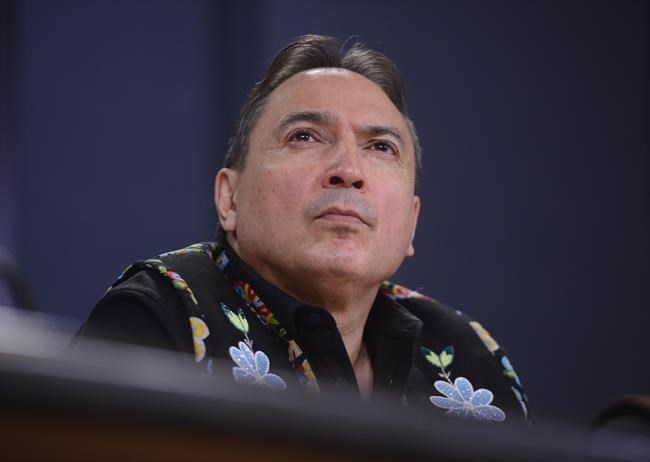OTTAWA — Public Safety Minister Bill Blair says the Liberal government will work on a law to ensure First Nations have the policing services they need and deserve — but questions are being raised about why this work has seemingly just started.
Blair told the House of Commons public safety committee Tuesday night he has recently begun contacting Indigenous leaders across the country to figure out how to best transform policing in their communities.
The Liberals promised to take action on First Nations policing over six months ago, first in the mandate letter Prime Minister Justin Trudeau issued to Blair in December and again in response to Indigenous protests against the Coastal GasLink project in northern B.C.
Assembly of First Nations National Chief Perry Bellegarde said this work is long overdue.
"Of course it should have started a long time ago," he said Wednesday.
"But now we have this opportunity to start working with them to get this done soon."
He and Indigenous leaders hope to seize upon the widespread calls for police reform in the wake of a number of violent police incidents involving Indigenous people across Canada to ensure things finally get done.
In February, amid countrywide road and rail blockades over objections by some Wet'suwet'en hereditary chiefs to the pipeline project in B.C., some asked whether Ottawa should do more to expand policing services run by First Nations to stop violent clashes between Indigenous people and police during pipeline protests.
Blair warned then this idea would not be a quick fix to the immediate issue involving the protests, noting that it would require "complex" and long discussions.
Changes to the way policing is conducted require provincial and territorial involvement and approval, as operational policing matters fall within provincial jurisdiction.
The First Nations Policing Program, created in 1992 as a "practical way to improve the level and quality of policing services for First Nations communities through the establishment of policing agreements," has helped to see approximately 60 per cent of First Nation and Inuit communities in Canada served at least in part by an Indigenous-run police force.
But Bellegarde says this program has long been plagued by funding shortfalls. The Assembly of First Nations has been pushing for First Nations-led policing to be upgraded from a mere program and enshrined in legislation.
"There is no legislative base, their financial resources are inadequate and yet that's what our people are expected to use to put in place a police service. Not acceptable," Bellegarde said.
"We're going to take advantage of this opportunity now to get it done and get it done properly and then we can start to look at community-based policing services from a First Nations perspective, and that's what this opportunity is all about: First Nations police seen as an essential service with a legislative base."
The Assembly of First Nations is also calling for a review of the Royal Canadian Mounted Police Act that would include giving more power to the Mounties' civilian oversight body. It also wants a zero-tolerance policy for excessive use of force within the RCMP and for the Mounties to wear body cameras to increase transparency.
Grand Chief Stewart Phillip of the Union of B.C. Indian Chiefs said he believes the long history of conflict between the RCMP and First Nations, Inuit and Metis has led to a point "beyond reconciliation." He said the only way forward is to enable and empower more Indigenous communities to be responsible their own policing.
Phillip also pointed to the role RCMP officers played in separating children from their families and taking them to residential schools, where many of them were abused, neglected and thousands died.
He echoed Bellegarde's calls for legislating Indigenous policing in Canada and said he believes the Liberals should have moved into action on this sooner.
"They've paid lip service with progressive notions on implementing the U.N. declarations as it pertains to Indigenous policing, but there's very little follow through, if any. And the consequences of that are Chantel Moore, for example, or other Indigenous Peoples that are either beaten or dying at the hands of police," Philip said Wednesday.
Moore was shot and killed by police earlier this month in New Brunswick after an officer with the Edmundston Police Force arrived at her home for a wellness check.
"This is a national emergency and it needs to be addressed. Enough talk, we need to prioritize this," Philip said.
In a statement Wednesday, Blair's spokeswoman Mary-Liz Power said the minister "has and will continue to speak with First Nations chiefs across the country about the disturbing incidents that have taken place over the last few weeks."
"It is a priority within Minister Blair's mandate to co-develop a legislative framework for First Nations policing, which recognizes First Nations policing as an essential service, and ensures that police services better reflect the communities they serve," Power said.
"Minister Blair will also work with interested communities to expand the number that are served by First Nations policing."
This report by The Canadian Press was first published June 24, 2020.
Teresa Wright, The Canadian Press



